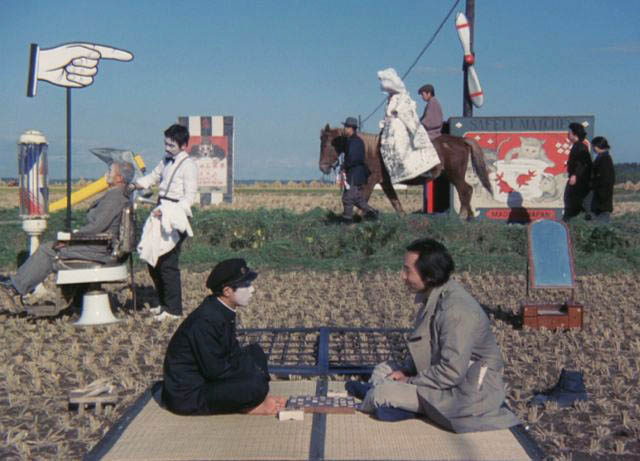
Pastoral Hide and Seek
"Den-en ni shisu"
Shuji Terayama might be called the Japanese Jodorowsky. They both worked in theater as well as film, graphics and novels. Both had an interest in pop culture, sex, politics and absurdist humor and both were thought audacious and excessive. Terayama's earlier works (Emperor Tomato Ketchup and Throw Away Your Books, Go into the Streets) were very much products of 1960s counterculture with their jagged psychedelic camera style, rock soundtracks and focus on politics and hedonism of the young.
Pastoral Hide and Seek (aka "Pastoral: To Die in the Country" - from 1974) is a stunner. It's stylized theatrical compositions, dream logic and social/psychological observation elevates this work into the realm of great cinema.
Few films are as visually striking and unrelentingly imaginative as this one. Set in a dreamlike rural Japan near a volcanic mountain, the story starts out to be about an adolescent boy's attempt to escape his overprotective mother and then surprisingly becomes a filmmaker's desire to confront his own elaborated creation. There is also an effort to reconcile the individual with the collective or old and new Japan through this parade of emblematic images. The old clock in the mother's house represents tradition and family while wrist watches are individualistic. In the small village; gossiping old women wear sinister eye patches while carrying vindictive stones from a bloody lake. An outcast simple-minded woman drowns her own baby, disappears and later returns as a sophisticated prostitute. A circus fat lady yearns to have her fake rubber body inflated by a dwarf which gives her sensual pleasure. Curious and astounding scenes abound, all contributing to an overwhelming experience of a creative mind interrogating itself.
Also known in English under the title: "Pastoral: To Die in the Country"